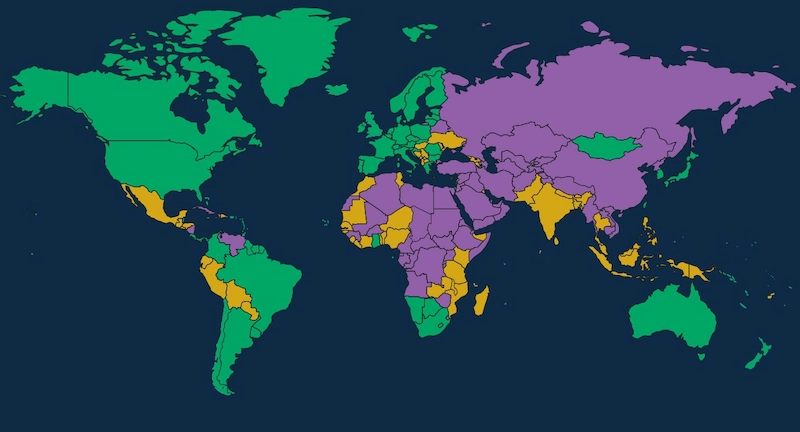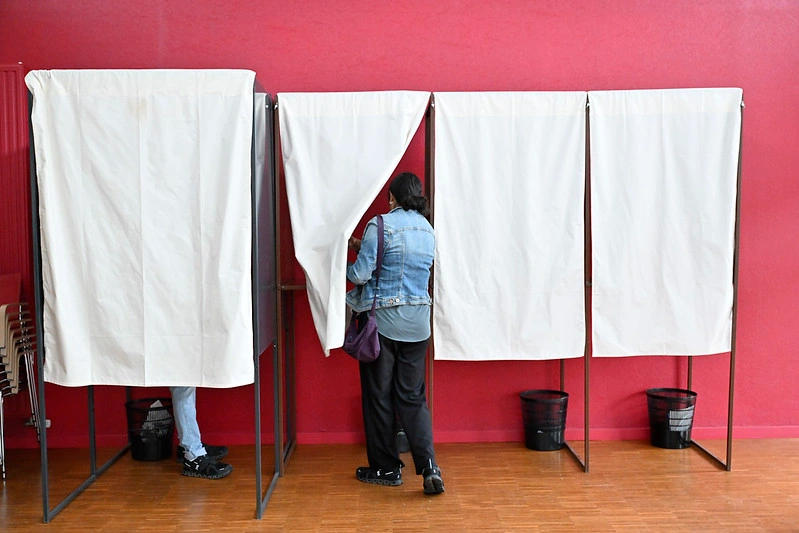Introduction
The year 2024 marks a crucial moment for global democracy. As the largest electoral cycle in history, nearly 3 billion voters in 60 countries have participated in elections, influencing the future of democratic governance.
However, reports from International IDEA, Freedom House, and V-Dem highlight significant threats to democratic integrity, including increased electoral disputes, autocratization, and restrictions on civil liberties.
Reports from International IDEA, Freedom House, and V-Dem emphasize the need for strategic interventions to protect and promote democracy.
This article provides an analysis of current global democracy trends, emphasizing the impact of elections and outlining strategies to strengthen democratic institutions amid rising authoritarianism.
The insights presented here draw from three comprehensive reports: The Global State of Democracy 2024, Freedom in the World 2024, and Democracy Report 2024, offering a clear picture of the challenges and opportunities for democracy this year.
A Worsening State of Democracy
The global state of democracy has deteriorated markedly over the past decade, with significant declines in political rights, civil liberties, and electoral integrity. According to Freedom House, 2023 marked the 18th consecutive year of declining global freedom, affecting 52 countries, while only 21 experienced improvements. V-Dem’s analysis corroborates this trend, noting that since 2009, more people live in autocratic regimes than in democracies.

These declines are not merely numeric but represent a shift in political norms, where autocratic regimes increasingly use electoral processes to legitimize their power. The erosion of democratic principles has been observed in countries across all regions, with particular severity in Eastern Europe, South Asia, and Sub-Saharan Africa.
Elections, which are fundamental to democratic legitimacy, have also become more contested. International IDEA notes that in nearly one-fifth of elections between 2020 and 2024, losing candidates rejected the results, often initiating legal challenges. This pattern undermines public trust in democratic processes and encourages a cycle of dispute and unrest.
Furthermore, the decline in global electoral participation, which fell from 65.2% in 2008 to 55.5% in 2023, suggests growing voter apathy and disillusionment. This decline is not only a sign of democratic fatigue but also of potential instability, as discontented citizens may turn to non-democratic means to express grievances.
Elections in 2024—A Year of High Stakes
In 2024, elections have been taking place across a diverse range of political systems, from established democracies to hybrid regimes and outright autocracies. This super-cycle year carries immense potential for both positive change and democratic backsliding.

According to International IDEA, the “super-cycle” is characterized not only by the number of voters but also by the variety of political contexts, from competitive elections in Brazil to more constrained environments in countries like Cambodia and Zimbabwe. As such, the integrity of these elections is a decisive factor in either reinforcing democratic norms or accelerating autocratic consolidation.
While elections offer an opportunity for citizens to influence political outcomes, they are increasingly subject to manipulation and interference. Freedom House identifies several forms of manipulation, including voter suppression, media censorship, and violence.
For example, in Ecuador, criminal organizations disrupted elections through targeted violence against candidates, while in Guatemala and Zimbabwe, incumbents sought to overturn electoral results through legal and extralegal means. V-Dem’s data reveals that in 23 countries, the quality of elections has deteriorated, marking a shift from fair competition to contested processes. This trend poses serious challenges not only to individual countries but to global democracy as a whole.
Strategies to Protect Electoral Integrity
- Enhance Election Monitoring: Deploy domestic and international observers to oversee voting processes and ensure transparency.
- Promote Voter Education: Implement campaigns to inform citizens about voting procedures, rights, and how to report fraud.
- Strengthen Legal Protections: Ensure robust laws that penalize electoral fraud and manipulation, supporting an independent judiciary to enforce them.
- Increase EMB Independence: Establish independent election management bodies that can resist political pressure and maintain impartiality.
- Encourage Digital Transparency: Use technology to provide real-time results reporting and reduce opportunities for tampering.
Autocratization and Its Impact on Governance
The global shift towards autocratization has been persistent and profound, with V-Dem identifying 42 countries currently experiencing declines in democratic governance. Autocratization often involves weakening institutional checks, suppressing media freedom, and reducing civil liberties.
According to V-Dem, 71% of the world’s population now resides in autocratic regimes, a stark increase from 48% a decade ago. This phenomenon has been particularly pronounced in populous countries like India, Russia, and Turkey, where democratic backsliding affects millions of citizens.
Democratic trends vary significantly across regions, with some areas showing resilience and others facing deepening autocracy.
The decline in democracy is often gradual but can also be sudden, driven by political leaders who erode constitutional limits and consolidate power. Freedom House highlights recent military coups in the Sahel region—specifically in Burkina Faso, Niger, and Sudan—as examples of abrupt autocratic shifts.
Meanwhile, countries that were once liberal democracies, such as Hungary and Poland, have increasingly restricted judicial independence, curtailed press freedom, and limited civil society activity. These developments not only undermine domestic governance but also contribute to broader regional instability, as autocratic regimes often engage in aggressive foreign policies to distract from internal issues.
Countermeasures Against Autocratization
- Support Civil Society: Provide funding and legal protection to NGOs and media organizations that promote transparency and accountability.
- Strengthen Institutional Safeguards: Reinforce checks and balances by supporting independent judiciaries and robust legislative bodies.
- Promote International Sanctions: Use diplomatic measures to penalize countries that engage in autocratization, thereby discouraging similar actions by other states.
- Encourage Democratic Diplomacy: Establish coalitions among democratic nations to support pro-democracy movements and apply coordinated pressure on autocratic regimes.
- Develop Resilience Programs: Train civil servants, journalists, and activists in digital security and organizational resilience to withstand autocratic repression.
Regional Dynamics in Democracy’s Decline
Democratic trends vary significantly across regions, with some areas showing resilience and others facing deepening autocracy. Latin America presents a mixed picture, with improvements in Brazil and setbacks in countries like Nicaragua and Guatemala.
Brazil’s recent elections, which saw the defeat of an incumbent president amid high voter turnout, serve as a model of democratic resilience, according to V-Dem. In contrast, smaller countries in the region struggle with entrenched corruption and weak institutions, limiting their capacity for democratic recovery.
Support local pro-democracy initiatives that engage citizens directly and encourage civic participation is essential.
In Eastern Europe and Central Asia, the decline in democracy is particularly severe. Countries like Russia and Belarus have consolidated autocratic rule, suppressing opposition and controlling media narratives. The region’s democratic backsliding is further exacerbated by conflicts, as seen in Ukraine and Nagorno-Karabakh, where authoritarian aggression undermines not only local governance but also regional stability.
Meanwhile, Sub-Saharan Africa faces its own challenges, with a series of military coups and authoritarian crackdowns eroding democratic gains made over the past two decades. Freedom House emphasizes that the impact of these events is not limited to individual countries but affects neighboring states by creating a precedent for power grabs.
Approaches to Address Regional Variations
- Tailored Interventions: Design region-specific programs that address local political, cultural, and social factors influencing democratic trends.
- Enhance Regional Cooperation: Foster collaboration among neighboring democratic states to share best practices and jointly respond to authoritarian threats.
- Promote Grassroots Movements: Support local pro-democracy initiatives that engage citizens directly and encourage civic participation.
- Focus on Economic Development: Link economic aid to governance reforms, incentivizing countries to maintain democratic standards.
- Encourage Transparency in Governance: Advocate for open government initiatives that increase public access to information and reduce corruption.
Conclusion
The state of global democracy in 2024 is marked by significant challenges, including electoral disputes, autocratization, and declining civil liberties.
However, elections this year provide a critical opportunity for democratic renewal, if managed with integrity and transparency.
Reports from International IDEA, Freedom House, and V-Dem emphasize the need for strategic interventions to protect and promote democracy.
Strengthening institutions, supporting civil society, and fostering international cooperation are essential steps to counteract autocratic trends and build resilient democratic systems.
As global elections unfold, the actions of governments, citizens, and international organizations will shape not only the outcomes of individual contests but the broader trajectory of global democracy.
References
- International IDEA, The Global State of Democracy 2024: Strengthening the Legitimacy of Elections in a Time of Radical Uncertainty.
- Freedom House, Freedom in the World 2024: The Mounting Damage of Flawed Elections and Armed Conflict.
- V-Dem Institute, Democracy Report 2024: Democracy Winning and Losing at the Ballot.


